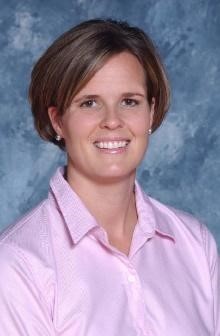Otterbein Allied Health Professionals Make Impact during Pandemic
Posted Jan 25, 2021
By Madelyn Nelson ’23
Derek Landes ’12 is fighting on the front lines of COVID-19 every day. Landes graduated from Otterbein with a degree in Allied Health, and is now one of the healthcare workers who have been working for months to fight the pandemic.
Landes works as an emergency room physician assistant for Mount Carmel Health System, a job that is more important now than ever before.

Dr. Shelley Payne, who started and oversees the Allied Health Program at Otterbein, says that it combines a foundation in the basic sciences and applied human anatomy and serves as a “springboard” for taking students from rigorous science courses to their next steps in the healthcare field.
Although most students with a degree in Allied Health from Otterbein pursue graduate study in physical therapy, occupational therapy and physician assisting, “We have students in medical school, chiropractic graduate school, and some students earn a bachelor’s degree in Allied Health and go on to complete an accelerated nursing program,” Payne said.
Otterbein’s Allied Health graduates have approximately an 85% acceptance rate into graduate schools. “These are highly-competitive graduate schools. A typical accepted student into physical therapy or physician assistant school has an undergraduate GPA of 3.7, a high GRE score, and experience in the field,” Payne said.
Regardless of what direction graduates take their Allied Health skills, many of them are fighting on the front lines of the pandemic just like Landes, who is working directly with COVID-19 patients and learning about the virus on the job.
“The severity of someone’s COVID infection can be very unpredictable. I have seen young and otherwise healthy people have a very hard time with the virus and then some older patients with underlying conditions do just fine with nothing more than seemingly a mild cold. This is why I stress the importance of following the guidelines even if you are young and healthy,” said Landes.
“Also, many people are unaware of the potential long-term effects of COVID including blood clots, stroke, chronic fatigue, and respiratory issues. Beating the initial virus is only half the battle many times,” he added.
Landes could not have foreseen the pandemic as part of his career development, but it has changed him not just professionally, but also personally.
“As a person, my outlook on life has changed quite a bit. I am grateful to still have a job, no matter how difficult it may be some days. I have always valued family time, but this is much stronger these days. It is difficult to see what some families go through when a loved one is in the hospital and they can only communicate via their nurse or a Zoom conversation on an iPad. I am thankful to be able to come home to my family every night,” Landes said.
After graduating from Otterbein, Landes earned his master’s degree in physician assistant studies at the Medical University of South Carolina. He has worked in the emergency departments at four different Mount Carmel Health System locations and as a PRN in an urgent care at Fayette County (Ohio) Memorial Hospital.
Landes recalls skills from Otterbein that helped him succeed beyond graduation. “In Allied Health, there was a heavy emphasis on orthopedic evaluation, and I still use many of the skills I learned from Dr. Payne in my everyday practice in the ER,” Landes said.
He also benefitted from the soft skills that Otterbein teaches every student. “One of the most important skills I learned at Otterbein, that helped in graduate school especially, is time management. Balancing sports, school, and work helped me manage the often-grueling schedule that physician assistant school entails,” Landes said.
Landes is setting a positive example for Allied Health students, and the entire Otterbein community. His dedication to his work is respectful and heroic and he serves his community in an extraordinary way. Words cannot fully capture the appreciation necessary toward health care workers, but it certainly starts with this – thank you.